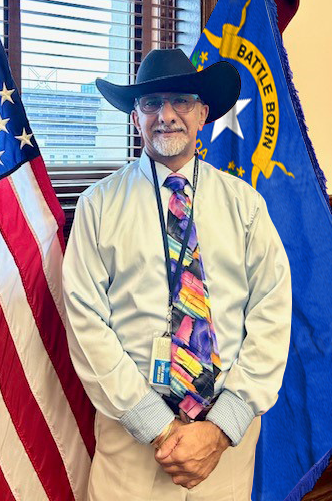Laura Knights, CEO and founder of Knights Consulting, shares what the second installment of ASTHO’s Ignite, Accelerate, Activate series has to offer public health leadership; Dr. Anil Mangla, director for disease surveillance and control at the South Nevada Health District...
Laura Knights, CEO and founder of Knights Consulting, shares what the second installment of ASTHO’s Ignite, Accelerate, and Activate series has to offer public health leadership; Dr. Anil Mangla, director for disease surveillance and control at the South Nevada Health District, highlights the benefits and ethical concerns of wastewater surveillance; ASTHO is launching its Public Health Nursing Learning Lab Series next Wednesday, July 23; and ASTHO warmly welcomes new member Dena Schmidt, administrator of the Nevada Division of Public and Behavioral Health, to the ASTHO community.
ASTHO Workshop: Ignite, Accelerate, and Activate: Series 2, Session 2: Conflict & Collaboration
ASTHO Webinar: Public Health Nursing Workforce Learning Lab
SUMMER JOHNSON:
This is the award-winning Public Health Review Morning Edition for Thursday, July 17, 2025. I'm Summer Johnson. Now, today's news from the Association of State and Territorial Health Officials.
LAURA KNIGHTS:
We will look at frameworks, we will look at evidence-based research, but it's more about things you can add to the toolkit that you can do the next day after the trainings after the webinar to really support collaboration on your team and in the workplace.
JOHNSON:
ASTHO recently kicked off the second installment in its Ignite, Accelerate, and Activate series with a session on navigating difficult conversations. Laura Knights of Knights Consulting is the Accelerate series' featured speaker. This is what she says the series can offer public health leaders and upcoming leaders.
KNIGHTS:
The Accelerate series is focused on supporting public health leaders to strengthen communication skills, particularly as managers and people leaders. In the three-part series, we'll focus on navigating difficult interpersonal conversations, addressing conflict while leading teams, and increasing accountability and performance through giving feedback.
JOHNSON:
Knights says the key to addressing conflict as a leader is self-awareness and being able to identify what your own default response may look like.
KNIGHTS:
While leaders may have a default or a comfort zone when addressing conflict, they should keep in mind that the situation may require them to stretch outside of their comfort zone to get a desired outcome. So, in this series, we'll- we'll look at those different tools so people can assess the situation and pick the best approach.
JOHNSON:
When it comes to effective communication, Knights stresses taking the time to assess the situation before responding.
KNIGHTS:
We want to respond appropriately, not just react. So, this requires not only taking stock of the context that's happening, like, is this a one-off thing? Is it a pattern thing? But also assessing the source of it and also practicing some self-regulation so that they are in the right headspace to respond. All of these factors can really support a successful communication exchange.
JOHNSON:
The second session of the series on conflict and collaboration is next week, Wednesday, July 23 at 2 p.m. Eastern. You can register for the event by using the link in the show notes.
ASTHO is holding an INSPIRE: Readiness webinar today, Thursday, July 17, at 2 p.m. Eastern Time, on ethical considerations of wastewater surveillance. Dr. Anil Mangla with the South Nevada Health District explains how wastewater surveillance protects communities from infectious disease.
ANIL MANGLA:
The wastewater surveillance actually allows the jurisdictions to identify emerging threats, target interventions in very clear areas, and then allocate resources more efficiently. We often see the spikes in wastewater way before cases are clinically reported in hospitals or in clinics.
JOHNSON:
Although this surveillance is intended to help protect people, some worry about the potential privacy violations associated with the ownership and access of wastewater data.
MANGLA:
A major ethical concern is the unplanned expansion of wastewater surveillance beyond its original public health intent. So, for example, the use by law enforcement or private entities.
JOHNSON:
Mangla says the webinar will equip public health professionals with tools to embed ethical considerations into their own wastewater programs.
MANGLA:
The ethical wastewater surveillance must prioritize fair distribution of benefits and burdens, right? So, there's benefits like we talked about, and there's some burdens. Communication is most important. So, findings must be communicated in a way that maintains scientific accuracy, avoids stigmatism, and empowers communities to take appropriate prevention action.
JOHNSON:
You can still sign up for today's webinar. We have a link in the show notes.
Coming up next Wednesday, July 23, ASTHO is launching the Public Health Nursing Learning Lab Series. The first session will dive into the evolving role of public health nurses. Learn about the current workforce landscape, challenges, and more with Shirley Orr, founding member and past president of the Association of Public Health Nurses. You can visit the link in the show notes to register for that series.
Finally, ASTHO would like to extend a very warm welcome to new member, Dena Schmidt, administrator of the Nevada Division of Public and Behavioral Health. Schmidt has dedicated over two decades to public service, shaping policies and programs to improve the well-being of Nevada residents, and has played a key role in bringing major health care reforms to reality. You can read more about Schmidt's work in her bio. We have a link in the show notes.
That'll do it for today. We're back tomorrow morning with more ASTHO news and information. I'm Summer Johnson. You're listening to the award-winning Public Health Review Morning Edition. Have a great day.






